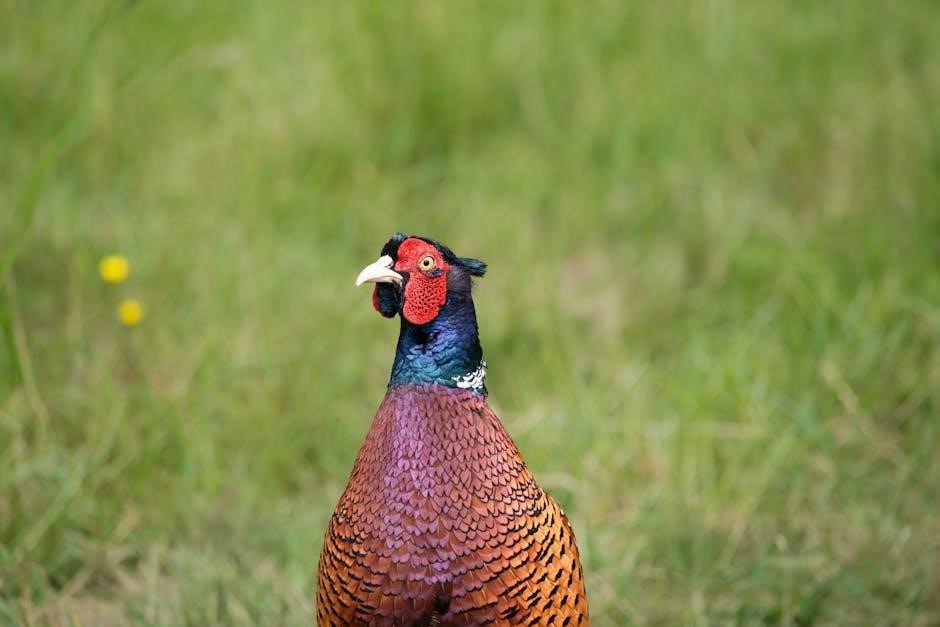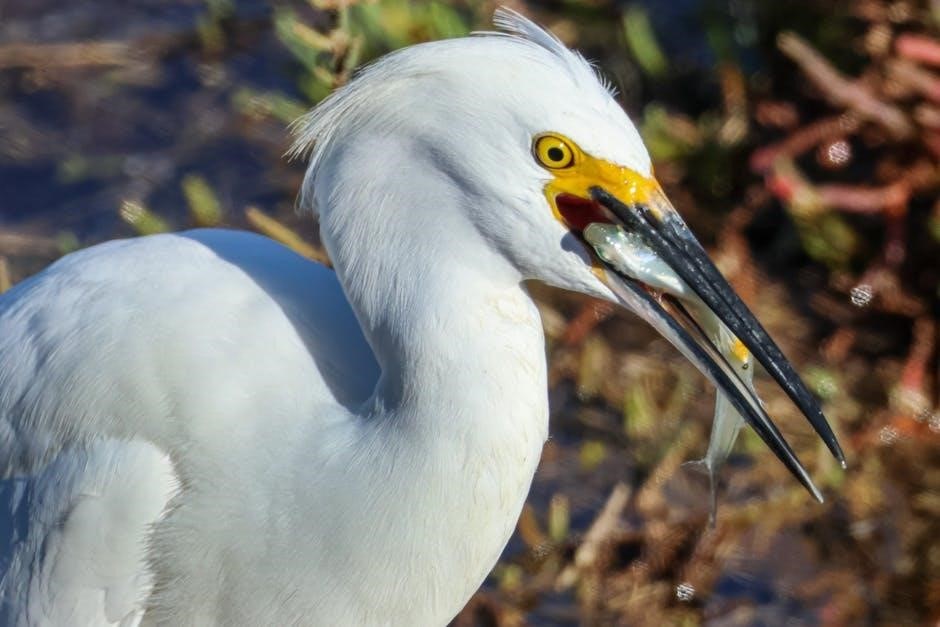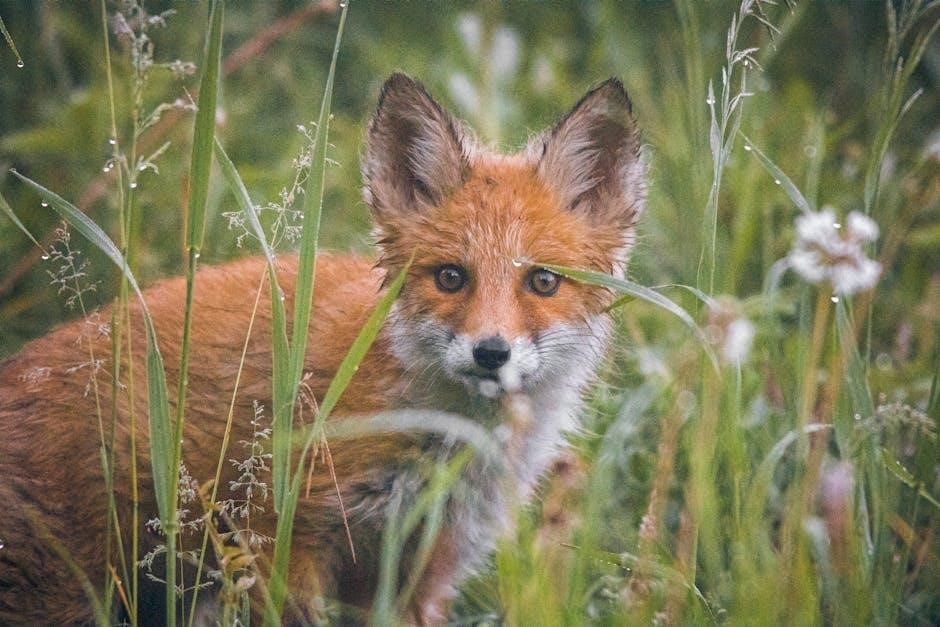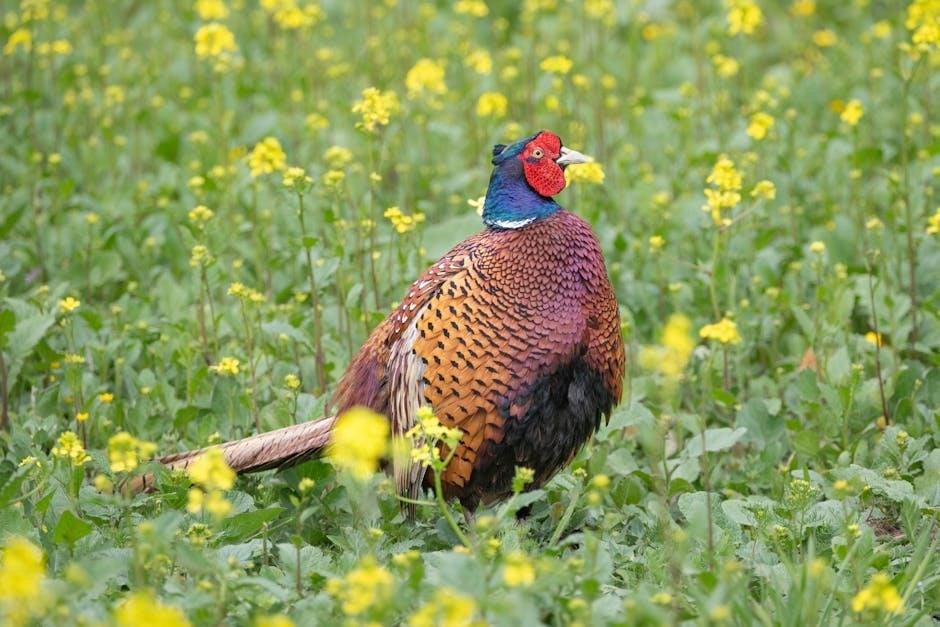Education and Training
Becoming a hunting guide requires enrolling in relevant courses like wildlife management, animal tracking, and wilderness first-aid. These programs provide essential knowledge and practical skills.
1.1 Relevant Courses in Wildlife Management and Animal Tracking
Enrolling in wildlife management and animal tracking courses is crucial for aspiring hunting guides. These programs teach habitat analysis, animal behavior, and conservation principles, which are vital for guiding. Many states require guides to complete such courses to ensure they understand local ecosystems and ethical hunting practices. Additionally, wilderness first-aid training is often included, equipping guides with emergency response skills. These courses provide a solid foundation for both novice and experienced hunters, ensuring they can lead safe and successful hunting expeditions while respecting wildlife and the environment.
1.2 Importance of Wilderness First-Aid Certification
Wilderness first-aid certification is essential for hunting guides, as it equips them to handle medical emergencies in remote areas. Guides often operate in locations where professional medical help is unavailable, making this training critical. The certification teaches how to assess injuries, stabilize patients, and prevent conditions from worsening. It also covers basic life-saving techniques, such as wound management and splinting. Many states require this certification for hunting guide licenses, ensuring guides can protect both themselves and clients in the field. This training is vital for maintaining safety and legal compliance during guided hunting trips.

Licensing and Certification
Obtaining a state-specific hunting guide license is crucial. Requirements often include passing exams, accumulating field days, and meeting certification standards to ensure legal and safe operations.
2.1 State-Specific Requirements for Hunting Guide Licenses
Each state has unique requirements for hunting guide licenses. For example, Manitoba mandates completing an application and meeting specific qualifications, sometimes requiring an exam. In British Columbia, while formal training isn’t mandatory for an assistant guide license, other states may demand passing a written test with 125 multiple-choice questions. Some areas require 40 field days of experience, combining hunting and guiding activities. These regulations ensure guides are well-prepared and knowledgeable about local laws, safety, and best practices, varying significantly by region.
2.2 The Guide Outfitter Examination Process
The Guide Outfitter Examination is a critical step in becoming a licensed hunting guide. The exam typically includes 125 multiple-choice questions, requiring an 80% pass mark. It is open-book, allowing 90 minutes to complete. The fee is $250 plus GST. The exam assesses knowledge of hunting laws, safety protocols, and best practices. Preparation involves studying local regulations, wildlife management, and ethical hunting practices. Passing this exam demonstrates competence and readiness to guide legally. It is a mandatory screening tool in many regions, ensuring guides meet high industry standards and can operate safely and effectively.

Gaining Experience
Gaining experience involves accumulating field days through hunting and guiding. Volunteering or paid guiding activities help build practical skills and a strong reputation in the industry.

3.1 Accumulating Field Days in Hunting and Guiding
Accumulating field days is crucial for aspiring guides. Many states require a minimum of 40 days of hands-on experience, combining personal hunting trips and guided outings. This practical exposure helps refine skills in tracking, navigation, and wildlife behavior. Volunteering or assisting experienced guides provides valuable insights and builds confidence in handling diverse field scenarios. Each day spent in the wilderness enhances your ability to lead and ensure safe, successful hunting expeditions, making you a more competent and reliable guide over time.
3.2 Building a Reputation Through Volunteer or Paid Guiding Activities
Volunteering or accepting paid guiding opportunities helps establish credibility and trust within the hunting community; By leading successful trips, you demonstrate competence and reliability, attracting positive reviews and referrals. Engaging in these activities allows you to refine your skills, adapt to varied client needs, and build a network of contacts. A strong reputation not only enhances your career prospects but also sets you apart as a professional guide. Consistent, excellent service fosters long-term relationships with clients and industry professionals, ensuring sustained growth in your guiding business.

Networking and Marketing
Attend trade shows starting in January to connect with industry professionals. Ensure contracts are in writing to avoid disputes. Promote your services online and locally to attract clients.
4.1 Attending Trade Shows and Outdoor Events
Attending trade shows and outdoor events is crucial for networking. These events provide opportunities to connect with industry professionals, promoting your services. Trade shows often start in January.
4.2 Creating Contracts and Legal Agreements with Clients
Creating contracts and legal agreements with clients is essential for protecting both parties. These documents should outline the scope of services, payment terms, and safety protocols. Contracts ensure clarity and prevent disputes. Make sure to include liability clauses and cancellation policies. Legal agreements also help establish professional credibility. Always have a lawyer review the contracts before finalizing them. This step ensures compliance with local laws and safeguards your business interests. Clear communication and mutual understanding are key to building trust with clients.

Understanding Legal and Safety Requirements
Understanding local hunting regulations, permits, and safety protocols is crucial. Guides must adhere to legal standards and implement best practices to ensure safe and lawful hunting experiences.
5.1 Knowledge of Local Hunting Regulations and Laws
Understanding local hunting regulations is essential for guides. Each state has specific laws regarding permits, bag limits, and hunting seasons. Guides must stay updated on these rules to ensure compliance and avoid legal issues. Familiarity with wildlife management areas, restricted zones, and licensing requirements is crucial. Additionally, knowledge of federal regulations, such as those related to migratory birds, is necessary. Guides should also be aware of any changes in laws and adapt accordingly to maintain professionalism and legality in their operations. This ensures safe and responsible hunting practices for both clients and the environment.
5.2 Implementing Safety Precautions and Best Practices
Ensuring client safety is paramount for hunting guides. Conduct pre-hunt briefings to outline safety protocols, such as proper firearm handling and emergency procedures. Carry a first-aid kit and know how to use it. Always maintain awareness of surroundings to prevent accidents. Guides should also monitor weather conditions and wildlife behavior to avoid dangerous situations. Establishing clear communication with clients and staying prepared for emergencies are critical. Following these best practices not only protects clients but also enhances the overall hunting experience and builds trust in your expertise as a guide.

Developing Hunting Etiquette and Client Relations
Mastering hunting etiquette involves respecting wildlife, clients, and the environment. Clear communication and managing expectations ensure a positive experience, fostering trust and repeat business as a guide.
6.1 Learning Basic Gun Safety and Hunting Etiquette
Understanding gun safety and hunting etiquette is crucial for guides. Proper handling, storage, and use of firearms ensure safety. Etiquette includes respecting wildlife, following local traditions, and maintaining ethical practices. These skills build trust with clients and enhance the overall hunting experience, promoting a positive reputation and fostering responsible hunting practices. Guides must also stay informed about local regulations to ensure compliance and avoid legal issues. By mastering these fundamentals, aspiring guides can create a safe and respectful environment for their clients, contributing to the preservation of hunting as a sustainable and ethical activity.
6.2 Managing Client Expectations and Providing Excellent Service
Effectively managing client expectations is vital for a successful guiding career. Clearly communicate the realities of the hunt, including weather, terrain, and wildlife behavior, to set realistic goals. Providing excellent service involves being attentive to clients’ needs, ensuring their safety, and offering a positive experience. This includes maintaining professionalism, patience, and adaptability. Offering pre-trip consultations and customized plans helps tailor the experience to individual preferences. Ensuring client satisfaction builds loyalty and referrals, which are crucial for growing your guiding business. Gather feedback to continuously improve and refine your services, fostering long-term relationships and a strong reputation.

Specialized Training Programs
Enroll in guide training courses and mentorship programs to gain hands-on experience. These programs focus on advanced guiding techniques, species-specific knowledge, and leadership skills for professional development.
7.1 Enrolling in Guide Training Courses
Enrolling in guide training courses is crucial for aspiring hunting guides. These courses cover essential topics such as hunting regulations, safety protocols, and wildlife management. Many programs are offered by reputable organizations and state agencies, ensuring comprehensive preparation. Courses often include both theoretical and practical training, allowing participants to gain hands-on experience. Additionally, these programs may focus on specific skills like animal tracking, first-aid, and client relations; Completing such courses not only enhances your expertise but also boosts your credibility as a professional guide, making you more competitive in the industry.
7.2 Participating in Mentorship Programs with Experienced Guides
Mentorship programs with experienced guides offer invaluable hands-on learning opportunities. These programs allow aspiring guides to gain practical knowledge and build confidence by working alongside seasoned professionals. Mentors share real-world insights, helping newcomers navigate challenges like client management and decision-making in the field. Through these relationships, individuals can refine their skills, learn about local ecosystems, and understand the ethical practices essential for successful guiding. Mentorship is a powerful way to bridge the gap between training and real-world experience, ensuring a smooth transition into the profession.

Staying Updated on Industry Standards
Staying informed about industry standards is essential for hunting guides. Continuous education on evolving regulations, best practices, and safety protocols ensures compliance and maintaining professional credibility.
8.1 Continuing Education in Hunting and Wildlife Management
Continuing education is crucial for hunting guides to stay updated on wildlife management and hunting practices. Many states require ongoing education for licensure, focusing on conservation, ethics, and safety. Courses often cover wildlife behavior, habitat management, and legal updates. Mentorship programs and workshops provide hands-on learning opportunities. Staying informed about best practices ensures guides can adapt to environmental changes and maintain professional standards. Regular training also helps guides understand new regulations and technologies, enhancing their ability to lead safe and successful hunting experiences.
8.2 Adapting to Changes in State and Federal Regulations
Hunting guides must stay informed about updates to state and federal regulations, as these changes can impact licensing, permits, and hunting practices. Regularly reviewing updates ensures compliance with laws regarding seasons, bag limits, and protected species. Guides can stay informed through workshops, newsletters, and official wildlife agency websites. Adapting to these changes is essential to avoid legal issues and maintain a professional reputation. Proactive engagement with regulatory bodies helps guides navigate evolving requirements and provide compliant, ethical hunting experiences for clients.

Leave a Reply
You must be logged in to post a comment.